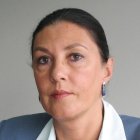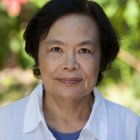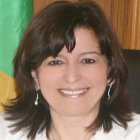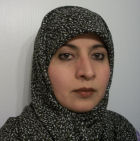Send to a friend
The details you provide on this page will not be used to send unsolicited email, and will not be sold to a 3rd party. See privacy policy.
Women from Jordan, Kenya, Pakistan, Peru and the Philippines tell SciDev.Net how they realised their dreams of careers in science.
Marriage, motherhood and poverty emerge as common obstacles to success in SciDev.Net‘s interviews with six women scientists of the developing world.
But, as the women tell their stories, there are common ingredients of success as well: personal ambition; determined mothers who overcame the odds to ensure their daughters were educated; and supportive husbands later in life.
Mary Abukutsa-Onyango, 52, professor at the Jomo Kenyatta University of Agriculture and Technology, Kenya. Mary Abukutsa-Onyango’s scientific career started with a childhood allergy. Unable to eat animal protein, she was given traditional vegetables by her mother, who knew they contained important nutrients. This started a lifelong passion for extolling the benefits of these vegetables. Supported by her father, who encouraged her to study science — unusual for a Kenyan father at the time — Abukutsa made a career by combining her twin passions: research and traditional vegetables.
Abukutsa faced opposition during her field research from farmers who insisted that, as a woman, she could tell them nothing about farming. "In the field, many people look at women with suspicious eyes," she says. And her male colleagues "said women are too emotional for science, and they do not want to give you credit … I have learned to speak up for myself."
To add to her struggles, researchers were sceptical of the importance of traditional vegetables — and of biodiversity in general. "Nobody wanted to know. The government of Kenya thought that this kind of research was not a priority."
Decades later, in 2010, Abukutsa was awarded the Order of the Burning Spear, one of Kenya’s highest civilian honours, for her work. This year, she received an African Union award for her research on the production of traditional vegetables in developing countries. "Many of the women who will see us receiving [these awards] will be encouraged; it will influence other young scientists."
But it was a long haul writing funding proposal after funding proposal. In the end, Abukutsa found her own means of carrying out research to support her argument that the vegetables are high in vitamins and other nutrients.
"When I tried to publish in international journals, they did not want to recognise my work — not because it was not good, but because they regard these traditional crops as weeds," she said. So she published her work in locally run university journals.
"[Now] it is gratifying to see more and more national and international initiatives on indigenous foods. I lead some of these."
Fabiola León-Velarde, 55, physiologist and president of Cayetano Heredia University, Peru. Fabiola León-Velarde also knows the frustration of being ignored, living in a country that has no science and technology ministry and that has allocated just 0.15 per cent of its gross domestic product (GDP) to science in the past decade.

León-Velarde: ‘Women scientists must take the decision to do everything [they] want and do it well’
Universidad Peruana Cayetano Heredia (UPCH)
Seven years ago, León-Velarde set herself a challenge: "If the country doesn’t support research, [I’ll] do it". Since then, the physiologist — an international authority on altitude sickness and, according to analysts, a strong candidate to be Peru’s first science minister if a ministry is created — has campaigned tirelessly to raise support for science. "A state that doesn’t invest in science and technology cannot move forward," she says.
Her work appears to be paying off, with the government launching funding for scholarships and US$10 million for research projects, the establishment of patent offices in the university system, and talk of building a technology park.
Engaging the public, particularly rural women, with science is important to León-Velarde. "I’ve taken [it on] as a personal battle, to both arouse the interest of rural women and have more women scientists in areas where we are [poorly] represented." Two such areas are engineering and physics, where less than ten per cent are women.
A wife and mother, León-Velarde — who was awarded France’s Legion of Honour last month — says that it is particularly important that women scientists persevere at that "critical stage" when they start having children.
She says that developing a career without neglecting your children and family is "a complicated issue … I felt that I had to make an extra effort in my life to be a good wife, a good mother and a good scientist.
"If women want to become outstanding scientists, with important projects and publications … they have to take the decision to do everything [they] want and do it well."
Lourdes Cruz, 69, professor at the Marine Science Institute, University of the Philippines Diliman, the Philippines. Lourdes Cruz says that motherhood is one of the main reasons for the lack of female academicians in the country and elsewhere. Many women in the Philippines get first degrees — for example, 60 per cent of chemistry graduates are women — but few stay on to pursue careers in science.



Cruz: ‘Working with others will help you get new ideas and open you up to new attitudes’
Micheline Pelletier for L’Oréal Corporate Foundation
"Women have greater opportunities here than in most Asian countries, but only 30 per cent of awardees [recipients of prestigious awards] are women," says Cruz. "Sometimes you have to choose between career and family." Cruz says this is one of the reasons she chose to remain single.
Cruz has spent most of her life studying cone snail toxins, or conotoxins, which are used in neuroscience. For her work, she received a L’Oréal-UNESCO For Women in Science Award in 2010 — becoming the first Filipino and the first South-East Asian scientist to do so — and was named National Scientist of the Philippines in 2006.
Born into a family of chemists, Cruz has published more than 120 papers. But she says has "barely scratched the surface".
Cruz encourages scientists to explore collaborative work. Her work on conotoxins, with a Filipino scientist based in the United States, has led to the development of a drug, currently in clinical trials, that seems to be more potent than morphine in treating chronic pain.
"It is very important to collaborate with other researchers and groups, especially for countries like the Philippines, which lack the equipment, materials and funding," says Cruz. "Working with others will help you get new ideas and open you up to new attitudes, which are important for young scientists’ personal growth."
For those who choose to have a family, collaboration is even more critical, she says. "Join a group, a support group or international collaborative work to get funding. The job has become easier with the Internet since you can search and communicate directly — something that we didn’t have in earlier days."
Sawsan A. Oran, 57, dean of the Faculty of Sciences at the University of Jordan, Jordan. It was the Iran–Iraq War, not motherhood, that interrupted Sawsan A. Oran’s career plans.



Oran: Balancing a scientific career and a family ‘takes time and effort but is not impossible’
Sawsan A. Oran
Oran was born into a poor village in the Tafila governorate, south of the capital city of Amman. Her father died when she was two years old and her illiterate mother encouraged her to go to school, hoping that one day she would be successful.
There were few educational opportunities for women at the time, and Oran says she was lucky to complete her secondary school education. Her ambition was to study biological sciences at university, even though women’s capabilities were often underestimated, particularly in science.
Oran somehow convinced her uncle and grandfather to both fund her Bachelor’s degree and allow her to obtain it at the University of Baghdad in Iraq, as her subject was not available in Jordan. But she had to abandon plans for a Master’s degree when the Iran–Iraq War broke out in 1980. She returned to Jordan, where she married a botany lecturer and had three children.
Nearly ten years later, Oran’s dream of becoming an eminent scientist was as alive as ever. In 1989, with her children in tow, she went to the University of Reading, United Kingdom, where she obtained a PhD in biological sciences. Since then, she has published more than 50 papers, has presented research at more than 80 conferences across the world, and is an active member of 14 science and environmental associations.
In 2009, Oran finally achieved her mother’s dream for her when she became the first female dean of the Faculty of Sciences at the University of Jordan, of which her husband is a member.
"Nowadays things are different," she says. "Girls can complete all of their studies in Jordan, without the added burden of being away from their family and country." She adds that Jordanian society is much more open to the idea of women scientists and is more appreciative of them.
Nevertheless, Oran advises female science students and researchers to "break the social constraints to achieve your science ambitions, and persuade your parents and spouses of the importance of your scientific achievements and their impact on the development of your country". She says that balancing a scientific career and a family "takes time and effort but is not impossible".
Tazeen Mohsin, 42, genetics researcher at the University of Karachi, Pakistan. Family has played an important role in Tazeen Mohsin’s career, particularly when she was diagnosed with breast cancer in 2008.
Mohsin: ‘I got enormous help from my husband. But not everyone has the same luck’
Suhail Yusuf
Mohsin was completing a PhD in plant biochemical genetics at the time and had to put her studies on hold for almost a year while she underwent radiotherapy, chemotherapy and surgery.
Now in remission, she has been awarded her PhD and her thesis has been published. She has also received a Young Scientists Award, a three-year research grant that will enable her to continue her research into the enhancement of glutenin, a nutritious protein, in bread.
Mohsin credits her husband with supporting her throughout her career and helping her to balance her research, teaching and family responsibilities.
"The support from [a] husband is very important — it’s like a whole new world opens up for you," she says. "I got enormous help from my husband. But not everyone has the same luck."
She recalls another female researcher who got married after receiving her Master of Philosophy degree. "She tried to do her doctorate many times, but could not sustain her research because of a lack of support from her husband and in-laws."
Women scientists face numerous hurdles in Pakistani society, Mohsin says. They are less likely to study science as there is a lack of investment in girls’ education. Parents also invest less in their daughters’ higher education because they usually expect them to remain at home once they are married.
Poverty is another hurdle. Although Mohsin lost her father at a young age, she had no financial difficulties because he had been a landlord and the family generated a significant amount of revenue from the land. For less fortunate women, scholarships and grants are the only options.
She says it is important for women scientists to be able to share their experiences, something that is currently lacking. She suggests a physical or virtual forum where women can share ideas and exchange research.
But Shazia Anjum, 39, former research associate at the University of Saskatchewan, Canada, does not feel that women are disadvantaged in her sphere of work in Pakistan.



Anjum: ‘[In Pakistan], women have their freedom … I don’t feel discriminated against’
Shazia Anjum
"[In Pakistan], women have their freedom. I see women working with men. I don’t feel discriminated against," says Anjum, who has more than ten years of research experience in chemistry and was previously assistant professor at the HEJ Research Institute of Chemistry at the International Center for Chemical and Biological Sciences in Karachi. She admits that this may not have been the case five years ago, but believes that globalisation has precipitated change in Pakistan.
"People are more aware of what is happening elsewhere in the world and have realised that progress cannot be achieved if more than 50 per cent of the population is sitting at home doing nothing," she says.
Anjum, who has visited Malaysia and Spain for her professional development, has authored and co-authored more than 80 research papers and has a US patent for isolating four anti-bacterial and anti-diabetic compounds from the evergreen shrub myrtle in Pakistan. In 2006 she was awarded the Izaz-i-Kamal Presidential Award, which few women have received.
Anjum’s father died when she was very young, so her mother decided to go to school — the first woman in her family to do so — to earn the money she would need to raise her two daughters. "I remember I was in grade three when my mother was taking her exams for grade eight," Anjum recalls.
When Anjum chose to study chemistry, she became the first woman in her family to go to university. "It was a challenge for me. I had to speak out and convince my mother that I was committed," she says.
Anjum has recently decided to return to Pakistan to pursue a career in her native country, and she hopes to establish a research institute in her home town of Bahawalpur.
According to Anjum, the real challenge to the scientific community in Pakistan is not gender discrimination, but the lack of facilities and dwindling political and financial support for research. Pakistan’s current regime, which was elected into office in 2008, does not support science, she says. "They are not investing funds in higher education. There is a huge brain drain."
Closing the gap
Women scientists such as Anjum are still the exception rather than the rule. Most believe that much work remains to be done to break down stereotypes and close the gender gap, particularly at the top.
The scientists themselves have a key role to play in developing more top female researchers, says Mary Abukutsa-Onyango. "Only women taking up leadership positions in science will have an impact on women who go through it [pursue a career in research]." She believes that mentoring programmes — such as the African Women in Agricultural Research and Development scheme, which pairs budding researchers with senior professionals — can finally help to make this happen.
Interviews by Joel D. Adriano, Hanan El-Kiswany, Smriti Mallapaty, Zoraida Portillo, Yojana Sharma and Suhail Yusuf.













